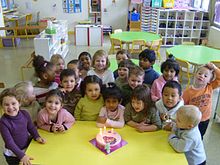Child: Difference between revisions
Tide rolls (talk | contribs) m Reverted edits by Jeffrey Leonard to last revision by JamesAM (HG) |
Undid revision 351029129 by Tide rolls (talk) |
||
| Line 1: | Line 1: | ||
{{About|the human "child", plural "children"|other uses}} |
{{About|the human "child", plural "children"|other uses}} |
||
they're about molesting young boys... |
|||
<br> |
|||
they are about molesting young boys!!!! |
|||
<br> |
|||
how to do it! |
|||
<br> |
|||
aaaaaarrrrrrgghhh.... |
|||
[[File:Children_in_a_Primary_Education_School.JPG|thumb|right|Children in school]] |
[[File:Children_in_a_Primary_Education_School.JPG|thumb|right|Children in school]] |
||
Revision as of 19:26, 20 March 2010
they're about molesting young boys...
they are about molesting young boys!!!!
how to do it!
aaaaaarrrrrrgghhh....

A child (plural: children) is a human between the stages of birth and puberty. The legal definition of "child" generally refers to a minor, otherwise known as a person younger than the age of majority. "Child" may also describe a relationship with a parent or authority figure, or signify group membership in a clan, tribe, or religion; it can also signify being strongly affected by a specific time, place, or circumstance, as in "a child of nature" or "a child of the Sixties."[1]
Legal definitions

The United Nations Convention on the Rights of the Child defines a child as "a human being below the age of 18 years unless under the law applicable to the child, majority is attained earlier."[2] Ratified by 192 of 194 member countries. Biologically, a child is anyone in the developmental stage of childhood, between infancy and adulthood.
Attitudes toward children
Social attitudes toward children differ around the world in various cultures. These attitudes have changed over time. A 1988 study on European attitudes toward the centrality of children found that Italy was more child-centric and Holland less child-centric, with other countries, such as Austria, Great Britain, Ireland and West Germany falling in between.[3]
Age of responsibility

The age at which children are considered responsible for their own actions (e.g., marriage, voting, etc.) has also changed over time, and this is reflected in the way they are treated in courts of law. In Roman times, children were regarded as not culpable for crimes, a position later adopted by the Church. In the nineteenth century, children younger than seven years old were believed incapable of crime. Children from the age of seven were considered responsible for their actions. Therefore, they could face criminal charges, be sent to adult prison, and be punished like adults by whipping, branding or hanging.[4]
Surveys have found that at least 25 countries around the world have no specified age for compulsory education. Minimum employment age and marriage age also vary. In at least 125 countries, children aged 7-15 may be taken to court and risk imprisonment for criminal acts. In some countries, children are legally obliged to go to school until they are 14 or 15 years old, but may also work before that age. A child's right to education is threatened by early marriage, child labour and imprisonment. [5]
Socialization of the child

All children go through stages of social development. An infant or very young child will play alone happily. If another child wanders onto the scene, he or she may be physically attacked or pushed out of the way. Next, the child is able to play with another child, gradually learning to share and takes turns. Eventually the group grows larger, to three or four children. By the time a child enters kindergarten, he or she is usually able to join in and enjoy group experiences.[6]
Children with ADHD and learning disabilities may need extra help in developing social skills. The impulsive characteristics of an ADHD child may lead to poor peer relationships. Children with poor attention spans may not tune in to social cues in their environment, making it difficult for them to learn social skills through experience.[6]
See also
- Child development
- Childhood
- Elterngeld
- Age of consent
- Defense of infancy
- Advertising to children
- List of youth topics
- Youth rights
- Children Youth and Environments Journal
References
- ^ "American Heritage Dictionary". 2007-12-07.
- ^ “Convention on the Rights of the Child” The Policy Press, Office of the United Nations High Commissioner for Human Rights
- ^ Rachel K. Jones and April Brayfield, Life's greatest joy?: European attitudes toward the centrality of children. Social Forces, Vol. 75, No. 4, Jun 1997. 1,239-69 pp. Chapel Hill, North Carolina.
- ^ Juvenile courts
- ^ Melchiorre, A. (2004) At What Age?...are school-children employed, married and taken to court?
- ^ a b Socialization stages
External links
- KidsHealth.org, a website on children's health
Template:Articles of the Universal Declaration of Human Rights
